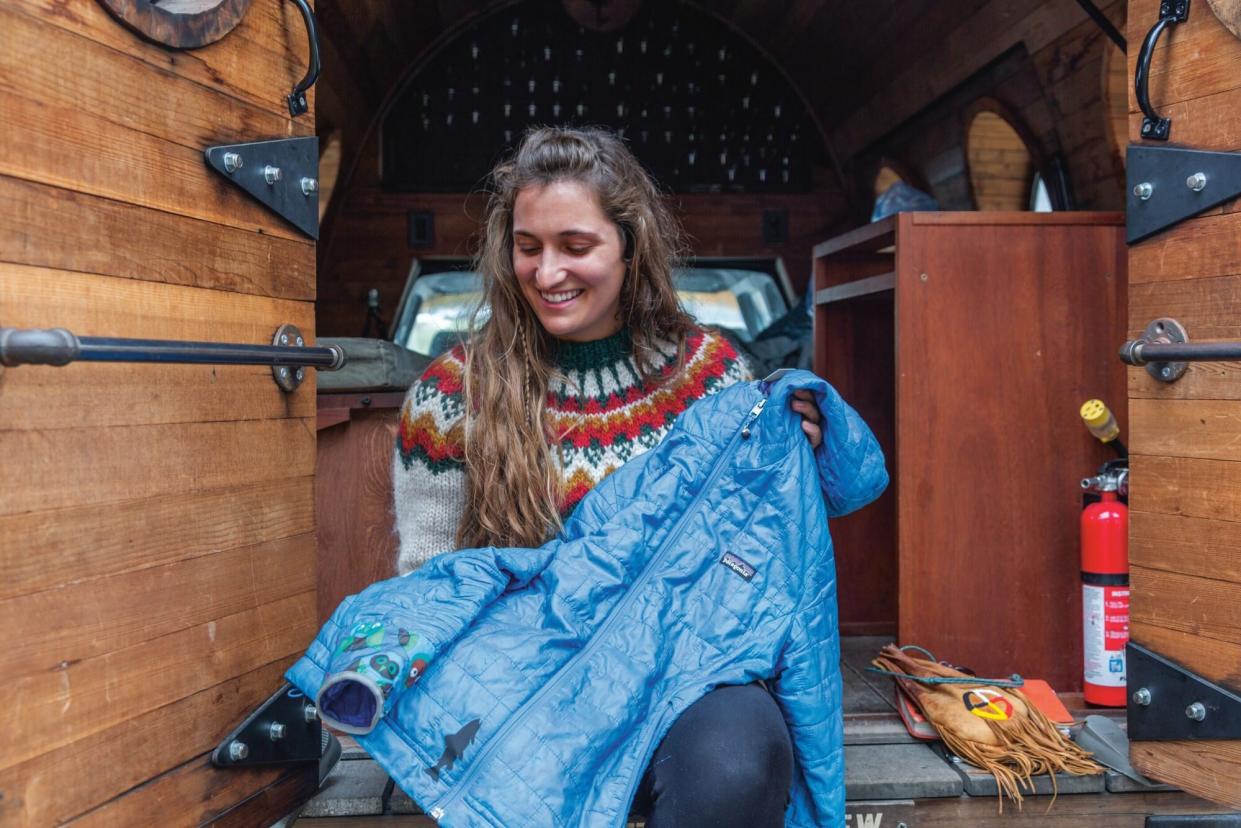Patagonia Wants You to Consider Buying Its Clothing Used This Holiday Season

Courtesy of Patagonia Courtesy of Patagonia
In 2011, Patagonia took an unapologetic stand against untrammeled Black Friday consumerism with an ad that had the phrase, "Don't Buy This Jacket."
Splashed across the pages of the New York Times — and on the holiest of retail's high holy days, no less — the plea to consumers was for them to consider the environmental cost of the brand's bestselling R2 fleece before buying it or any other garment. It was bold, unexpected, and even blasphemous.
But it was also a harbinger of things to come from the unabashedly pro-planet, anti-materialistic outdoor clothing and equipment purveyor, which has in the ensuing years reinvented shopping's busiest day into a vehicle for climate awareness and philanthropy. Since 2016, it has marshaled Black Friday to raise millions of dollars for grassroots groups fighting for cleaner air, water, and soil.
"We really believe that Black Friday, as a concept, is really unhealthy to our health and global health," Jenna Johnson, head of Patagonia, tells InStyle. "The idea of consuming for the sake of consuming is completely opposite of where we need to go as a society in order to rein in our carbon footprint and be able to make a positive impact on this immense climate issue that we're dealing with."

Courtesy of Patagonia
RELATED: Let's Stop Pretending We Need New Clothes Every Season
This Black Friday, Patagonia is encouraging another mental shift with the launch of "Buy Less, Demand More." Part campaign, part rallying cry, it heralds the next phase in the company's evolution, including tighter integration of its four-year-old Worn Wear program for used clothing and gear. Now when customers browse for, say, a new V-neck sweater or a pair of running tights on the Patagonia website, they'll see a button that links to refurbished alternatives on the trade-in platform at a lower price.
Of course, Amazon customers are familiar with choosing between used and new versions of the same item, but the move is the first from a major clothing company. If shoppers see a secondhand option that works for them, that's great, Johnson says. If they still want the brand new item, that's fine, too. She just wants them to take a pause, break the conditioning that brand new is the only route, and become more discriminating about their purchases by setting higher expectations, whether they're for recycled materials, organic fibers, or fair labor.
"Taking that minute to even reflect and think about the options in order to make a really conscious decision to buy a new product, we feel is really important," Johnson says. "It's very much inspired by the 'Don't Buy This Jacket,' but in a really beautiful, organic way, where it is now a part of who we are as a brand."
Buying used clothing is better for the planet, experts say, because it requires no new resources and keeps potential textile waste out of the landfill or incinerator. (The Ellen MacArthur Foundation estimates that just 1 percent of materials used to produce clothes is currently recycled into new ones.) Keeping a garment in circulation for another three months results in a 5 percent to 10 percent reduction in each of its carbon, waste, and water footprints, according to the Waste & Resources Action Program, a U.K. environmental nonprofit.
The expanded Worn Wear site will also feature a "robust" collection of do-it-yourself clothing repair videos to allow consumers to extend the lives of their garments, Johnson says. If they'd rather mail in their items and let the experts work their magic, Patagonia will make that easy, too.

Courtesy of Patagonia
Online thrift has been a bright spot in the battered retail landscape, particularly in the face of the Covid-19 pandemic, which has taken a toll on consumer confidence. By 2029, resale is poised to surge past $80 billion in value, surpassing fast fashion's projected numbers ($43 billion) for the first time, according to secondhand e-tailer ThredUp and research firm GlobalData.
And Patagonia, for its part, is all in. At some point, Johnson says she hopes the retailer will receive enough trade-ins so anyone visiting the Patagonia website will be able to buy the same exact item used.
"We want to continue to spur demand in the secondhand market," Johnson explains. "And we are looking at lots of other ways that we can offer non-new products to our customers — while recognizing there is a need sometimes for new products. But we want that to be very intentional, and done with responsibility and strong awareness and consciousness."
Eventually, Johnson says Patagonia wants to reduce the number of new products it brings into the world. But first, education is key, as is a change in entrenched consumer behavior.
"I think the most important thing for 'Buy Less, Demand More' is making sure we empower individuals to make choices," she adds. "We're putting the onus on the customer to take ownership over the choices they make when they use their dollars to … buy the things that will have an impact on the environment for years to come."


